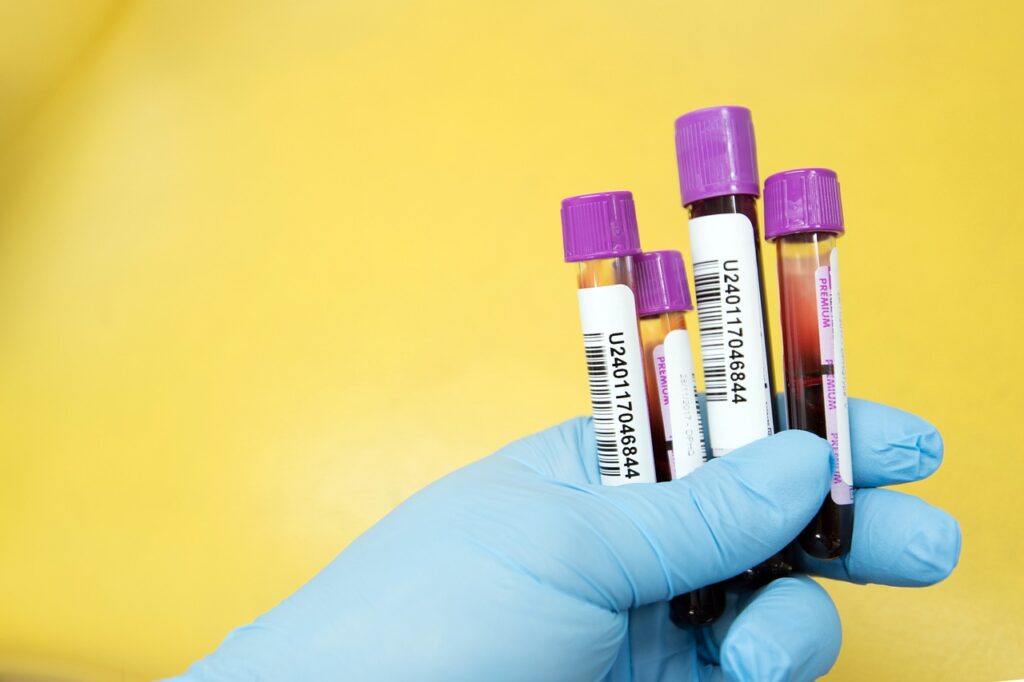Dealing with random symptoms like weight gain and hair loss and wondering if your thyroid is to blame? You’re not alone.
Roughly 20 million Americans have some type of thyroid disorder. Yet, around 60% of them are unaware they have a problem.
Your thyroid affects your metabolism, mood, energy levels, and much more. So when your thyroid is out of whack – you feel it.
In this article, we’ll break down common signs of thyroid imbalance and the best tests to check your thyroid function.
But to start, let’s dive into what exactly the thyroid does.
What Does the Thyroid Do?
Your thyroid, part of your endocrine system, is a small, butterfly-shaped gland inside your neck. Its job is to make and release the thyroid hormones T4 (thyroxine) and T3 (triiodothyronine).

Your thyroid hormones control many bodily processes, including:
- Metabolism
- Energy
- Mood
- Body temperature
- Heart rate
- Growth and development
- And much more…
But your thyroid doesn’t work alone. The pituitary gland helps regulate your thyroid hormones. It does this by secreting thyroid-stimulating hormone (TSH).
When the pituitary gland senses your thyroid hormones are running low, it releases TSH. This tells your thyroid to make more thyroid hormones.
But sometimes your thyroid can get off balance.
If your thyroid becomes sluggish, it may not make enough thyroid hormones. This can lead to hypothyroidism, also known as an underactive thyroid.
But if your thyroid is overactive, it may produce too many of these hormones. This can lead to hyperthyroidism.
Thyroid Symptoms to Watch Out for
Since the thyroid is involved in so many bodily systems, when it’s off balance, symptoms run the gamut.
Adding to the confusion, many thyroid symptoms mirror other health conditions – or are considered a ‘normal’ part of aging.
This makes it tricky to tell whether your thyroid is stirring up symptoms, or if something else is the culprit.
Symptoms of thyroid imbalance vary depending on whether your thyroid is underactive or overactive.
Symptoms of hypothyroidism
An underactive thyroid slows body functions down. This can lead to symptoms like:

- Fatigue
- Weight gain
- Depression
- Sensitivity to cold
- Dry skin
- Constipation
- Hair loss
- Slow heart rate
- Muscle weakness
- Hoarse voice
- Memory issues
Symptoms of Hyperthyroidism
An overactive thyroid revs the body up. This can bring on symptoms such as:

- Anxiety
- Weight loss
- Trouble sleeping
- Sensitivity to heat
- Muscle weakness
- Vision problems
- Irregular periods
- Diarrhea
- Fast heart rate
- Thin skin
- Brittle hair
- Increased appetite
Risk Factors for Thyroid Imbalance
Gender and age are the two biggest risk factors for developing thyroid issues. According to the American Thyroid Association, women are five to eight times more likely to have a thyroid problem than men. And as far as age, people over 60 are most at risk.
That said, anyone at any age can develop a thyroid problem.
Other risk factors for thyroid dysfunction include:
- Having a family history of thyroid issues
- Smoking
- Stress
- Chronic inflammation
- Autoimmune disease (such as Celiac disease or type 1 diabetes)
- Adrenal fatigue
- Toxin exposure
- Nutritional deficiencies (especially iron, iodine, selenium, zinc, and vitamin D)
- Endocrine-disrupting chemicals (EDCs) such as BPA and phthalates
What Causes Thyroid Imbalance?
Autoimmune disease is by far the most common cause of thyroid disorders. But thyroid issues can happen for loads of reasons.

Hypothyroidism may be caused by:
- Hashimoto’s thyroiditis: This autoimmune disease causes the immune system to attack the thyroid gland. It affects about 1 in 20 Americans – and is the leading cause of hypothyroidism. Women are 4 to 10 times more likely to develop Hashimoto’s than men (typically between the ages 30-50).
- Thyroiditis: This is an inflammation of the thyroid gland, which can harm hormone production.
- Iodine deficiency: Your thyroid needs iodine to make thyroid hormones. So if you’re low on iodine, your thyroid hormones may be low too.
- Pituitary problems: If your pituitary gland doesn’t produce enough TSH, it can throw off your thyroid hormones.
- Postpartum thyroiditis: Roughly 5-10% of mothers develop this condition after having a baby. It occurs in the first year after delivery and is usually temporary.
- Certain medications: Lithium and some cancer and heart meds may reduce your thyroid hormones.
Hyperthyroidism may be caused by:
- Grave’s disease: This autoimmune disease causes the thyroid to produce too much thyroid hormone. Grave’s disease affects 1 in 100 Americans and is to blame for 4 out of 5 cases of hyperthyroidism.
- Too much iodine: Excess iodine can lead the body to make too many thyroid hormones. This can happen from consuming too much-iodized salt, seaweed, or supplements containing iodine.
- Nodules: These are small growths that can form on your thyroid. Nodules can cause the thyroid to become enlarged and make excess thyroid hormones.
- Viral infections: Some upper respiratory infections can inflame the thyroid, causing subacute thyroiditis. Typically, hyperthyroidism resolves once the infection clears.
How Do I Get My Thyroid Levels Checked?

If you’re dealing with many symptoms of thyroid imbalance, you’ll want to get blood testing.
Taking a blood test can help identify whether your thyroid is overactive or underactive, and how severe the imbalance is. Some tests also detect whether autoimmunity could be throwing your thyroid off.
Fair warning: Most conventional doctors only test for TSH (and maybe T4 if you get lucky).
But TSH is only one piece of the puzzle. Relying on TSH alone causes many people with thyroid issues to fall through the cracks for years.
That’s why it’s best to do your research and know the right tests to ask for. So without further ado, here are the best tests to check your thyroid function:
TSH (Thyroid-stimulating hormone) test
As mentioned, TSH is the go-to test for checking your thyroid. Remember, your pituitary gland works on a feedback loop with your thyroid by releasing TSH. A ‘normal’ TSH is considered anything between 0.4 – 4.0 mIU/L.
If your TSH is low, it suggests your body is making too many thyroid hormones (hyperthyroidism). If your TSH is high, it could mean your body is not making enough thyroid hormones (hypothyroidism).
T4 (thyroxine) tests
Of all the hormones your thyroid makes, 90% of it is T4. The trouble is, most T4 is bound to proteins, which your body can’t use. Only about 1% of T4 is unbound and available to your cells. This is known as free T4.
A total T4 test measures how much bound and free T4 is in your bloodstream. A free T4 test tells you how much T4 is available to your cells.
A high TSH and low free T4 suggest hypothyroidism. A low TSH and high free T4 indicate hyperthyroidism.
T3 (triiodothyronine) tests
T3 is the other main hormone your thyroid makes. Like T4, most T3 is bound by proteins. Only free T3 is available to your cells.
A total T3 test measures the amount of bound and free T3 in your system. A free T3 test tells how much T3 is unbound and available.
High T3 levels often indicate hyperthyroidism.
Thyroid antibodies tests
Your immune system is in charge of protecting you from harmful pathogens like viruses, bacteria, and parasites. Normally, that’s a good thing!
Yet sometimes the immune system gets confused and mistakes healthy tissue, such as your thyroid, for a foreign invader. When this happens, your body produces antibodies. This can lead to autoimmune disorders like Hashimoto’s thyroiditis and Grave’s disease.
Thyroid peroxidase antibody or thyroglobulin antibody testing can pinpoint whether low thyroid function may be due to Hashimoto’s disease.
Thyrotropin receptor antibody testing can help uncover whether an overactive thyroid may be due to Grave’s disease.
How Do You Treat Thyroid Imbalance?
That depends on who you ask! Conventional treatment for thyroid issues involves medications, surgery, or radioactive iodine.

Functional medicine takes a more holistic approach. Nutrition, lifestyle, and supplements can all support the thyroid in coming back into balance naturally.
We have to look at you, the whole person to understand the thyroid imbalances that are unique to you. And sometimes we have to dig even deeper. We also have to see how healthy your adrenal glands are and address any imbalances you might also be experiencing and might not even realize. The health of your adrenal glands has a direct (and indirect) impact on the health of your thyroid and other hormones too.
Begin Working with A Functional Medicine Doctor in Orland Park, IL
If you’re struggling with symptoms of thyroid imbalance, Anchored in Health is here to help. Our functional medicine doctor performs a thorough health history and runs a complete thyroid panel to assess your thyroid health. Based on those results, you get a personalized treatment plan, with nutrition and lifestyle recommendations, and targeted supplements designed to restore balance to your thyroid. So if you’re ready to get answers for your random symptoms and finally find relief, follow these steps:
- Contact us with questions or to learn more.
- Schedule your first appointment with Anchored in Health here.
- Discover how functional medicine can bring your thyroid back into balance.
Other Health Services Offered At Anchored in Health in Orland Park, IL
At Anchored in Health, we offer a variety of health and wellness services to help you feel your best. This includes other services in addition to genetic testing. We also offer functional medicine, acupuncture, thermograms, and the Shape ReClaimed program. Contact us to find out how we can help you improve your health and well-being.
Disclaimer: The information provided on this blog is for educational and informational purposes only and is not intended to diagnose, treat, cure, or prevent any disease. The content is not a substitute for professional medical advice, diagnosis, or treatment. Always seek the guidance of a qualified healthcare provider with any questions you may have regarding your health or a medical condition.
Reading this blog does not establish a doctor-patient relationship between you and Anchored In Health or any of its practitioners. Reliance on any information provided in this blog is solely at your own risk. For medical concerns, always consult a licensed healthcare provider.
References
- https://www.thyroid.org/media-main/press-room/
- https://www.ncbi.nlm.nih.gov/books/NBK279388/
- https://www.mayoclinic.org/diseases-conditions/hypothyroidism/symptoms-causes/syc-20350284
- https://www.niddk.nih.gov/health-information/endocrine-diseases/hashimotos-disease
- https://www.thyroid.org/postpartum-thyroiditis/
- https://www.niddk.nih.gov/health-information/endocrine-diseases/graves-disease
- https://pubmed.ncbi.nlm.nih.gov/30891786/#
- https://www.pennmedicine.org/for-patients-and-visitors/patient-information/conditions-treated-a-to-z/subacute-thyroiditis
- https://www.thyroid.org/patient-thyroid-information/ct-for-patients/january-2020/vol-13-issue-1-p-5-6/
- https://www.thyroid.org/thyroid-function-tests/
- https://www.ncbi.nlm.nih.gov/books/NBK537039/
- https://www.urmc.rochester.edu/encyclopedia/content.aspx?contenttypeid=167&contentid=t4_free_and_bound_blood
